译林牛津版高中英语选修9:U1 重点词汇讲解教案
- 格式:doc
- 大小:68.00 KB
- 文档页数:8
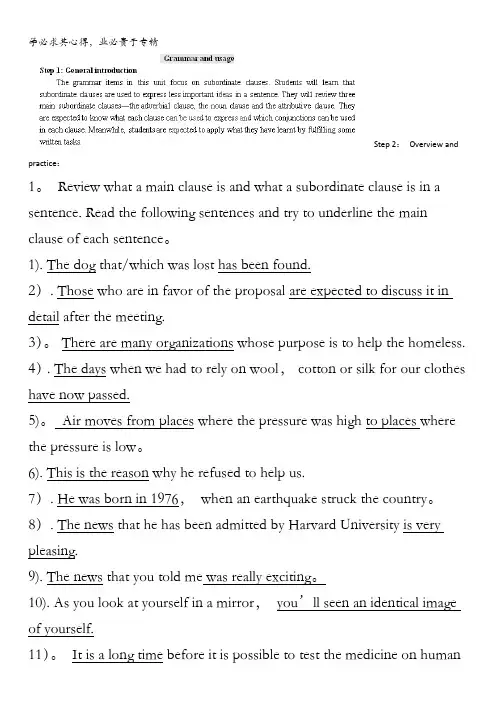
Step 2:Overview and practice:1。
Review what a main clause is and what a subordinate clause is in a sentence. Read the following sentences and try to underline the main clause of each sentence。
1). The dog that/which was lost has been found.2). Those who are in favor of the proposal are expected to discuss it in detail after the meeting.3)。
There are many organizations whose purpose is to help the homeless. 4). The days when we had to rely on wool,cotton or silk for our clothes have now passed.5)。
Air moves from places where the pressure was high to places where the pressure is low。
6). This is the reason why he refused to help us.7). He was born in 1976,when an earthquake struck the country。
8). The news that he has been admitted by Harvard University is very pleasing.9). The news that you told me was really exciting。

牛津高中英语教学设计单元:Unit 1 Other countries, other cultures板块:Word powerThoughts on the design:本节课是词汇教学课。
词汇教学在高中英语教学中占据重要位置,正如著名语言学家威尔金斯(D.A.Wilkins)曾经说过“Without grammar, very little can be conveyed; without vocabulary, nothing can be conveyed.” 这句话的中文意思是“没有语法,难以表达;没有词汇,寸步难行。
”词汇教学有效的方法之一就是按主题将相关词汇分类组块学习,这有助于学生的长期记忆和灵活运用。
本节课词汇学习的焦点是关于描述国家的单词,即从哪些方面介绍一个国家。
Teaching aims:After learning the section, the students will be able to know what words can be used to describe a country. They are expected to use the words learnt in class to complete the relevant exercises. Meanwhile, the students will gain some knowledge of the United Kingdom, which helps them to promote their cross-cultural awareness.Teaching procedures:Step 1 Brainstorming1. Begin the lesson by reviewing the reading passage ‘Canada—land of the maple tree’. Ask students to answer the following question:What subjects are covered in the passage of Canada—land of the maple tree?2. Show the pictures of Big Ben and Tower Bridge to students, and ask them the questions:(1) Do you know the buildings in the pictures?(2) In which country do they lie? (In the United Kingdom.)3. Ask students to think about the following question:If we were to write a book about the United Kingdom, what subjects should be covered in the book?[Explanation]鼓励学生尽可能多地说出相关词汇。
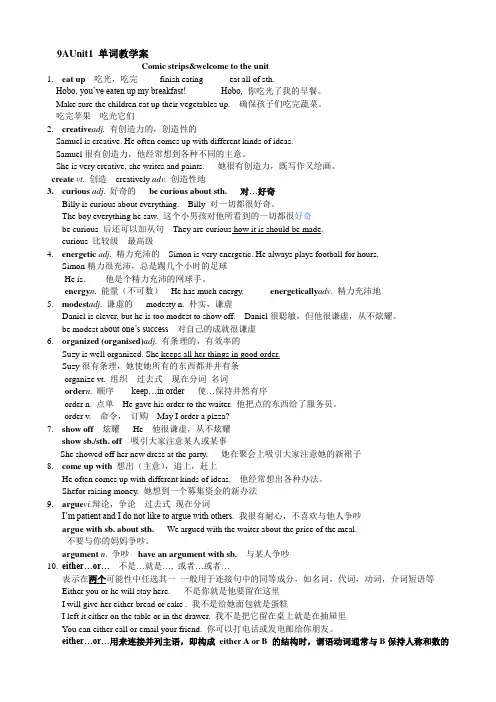
9AUnit1 单词教学案Comic strips&welcome to the unit1.eat up 吃光,吃完finish eating eat all of sth.Hobo, you’ve eaten up my breakfast! Hobo, 你吃光了我的早餐。
Make sure the children eat up their vegetables up. 确保孩子们吃完蔬菜。
吃完苹果吃光它们2.creative adj.有创造力的,创造性的Samuel is creative. He often comes up with different kinds of ideas.Samuel很有创造力,他经常想到各种不同的主意。
She is very creative, she writes and paints. 她很有创造力,既写作又绘画。
create vt.创造creatively adv.创造性地3.curious adj. 好奇的be curious about sth. 对…好奇Billy is curious about everything. Billy 对一切都很好奇。
The boy everything he saw. 这个小男孩对他所看到的一切都很好奇be curious 后还可以加从句They are curious how it is should be made.curious 比较级最高级4.energetic adj. 精力充沛的Simon is very energetic. He always plays football for hours.Simon精力很充沛,总是踢几个小时的足球He is. 他是个精力充沛的网球手。
energy n. 能量(不可数)He has much energy. energetically adv. 精力充沛地5.modest adj. 谦虚的modesty n. 朴实,谦虚Daniel is clever, but he is too modest to show off. Daniel很聪敏,但他很谦虚,从不炫耀。
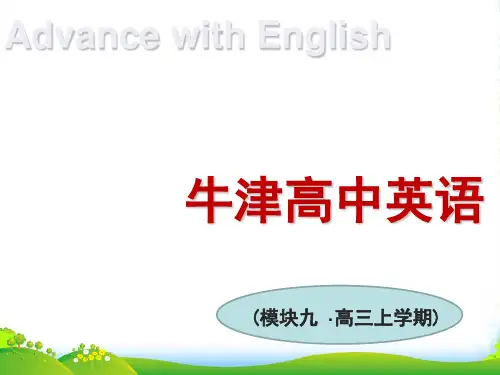
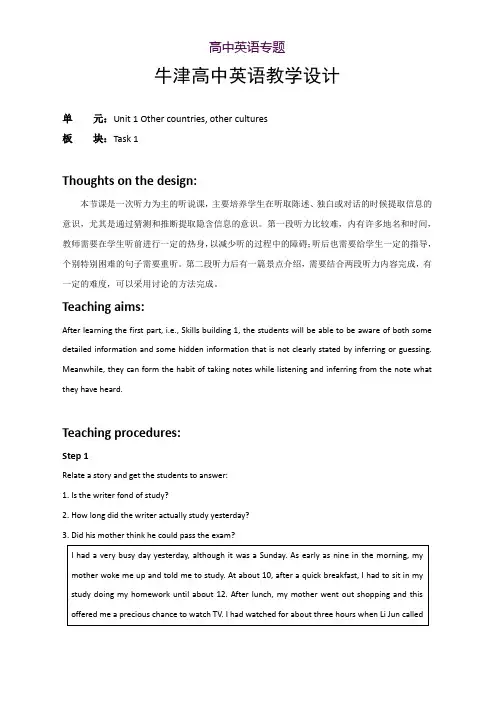
牛津高中英语教学设计单元:Unit 1 Other countries, other cultures板块:Task 1Thoughts on the design:本节课是一次听力为主的听说课,主要培养学生在听取陈述、独白或对话的时候提取信息的意识,尤其是通过猜测和推断提取隐含信息的意识。
第一段听力比较难,内有许多地名和时间,教师需要在学生听前进行一定的热身,以减少听的过程中的障碍;听后也需要给学生一定的指导,个别特别困难的句子需要重听。
第二段听力后有一篇景点介绍,需要结合两段听力内容完成,有一定的难度,可以采用讨论的方法完成。
Teaching aims:After learning the first part, i.e., Skills building 1, the students will be able to be aware of both some detailed information and some hidden information that is not clearly stated by inferring or guessing. Meanwhile, they can form the habit of taking notes while listening and inferring from the note what they have heard.Teaching procedures:Step 1Relate a story and get the students to answer:1. Is the writer fond of study?2. How long did the writer actually study yesterday?3. Did his mother think he could pass the exam?Answers:1. No, h e isn’t.2. For only two hours.3. No, she didn’t.Ask the students: How do you know?1. The writer isn’t fond of study?2. He studied for only two hours?3. The writer’s mother didn’t think he could pass the exam?Answer:From the story, we know that the writer hates to get up early to study. He only studied between about 10 and 12, which is approximately two hours. Besides this, he did nothing but watch TV or play football. The mother’s way of speaking when she says, “Oh, really? I wish you could.” w ith a cold smile suggests that she didn’t think he could pass the exam.Summary:When you are listening to a speech or a conversation, sometimes you have to infer or guess some of the information that is not clearly stated; or sometimes you have to pay special attention to the detailed information though it’s mentioned directly. In this case, you have to take notes and see what you can learn from the speech or conversation.[Explanation]这一部分作为热身,主要是让学生知道:不管是文章、独白还是对话,都有可能存在着一些隐含信息,而获取隐含信息的主要途径是推断或猜测。
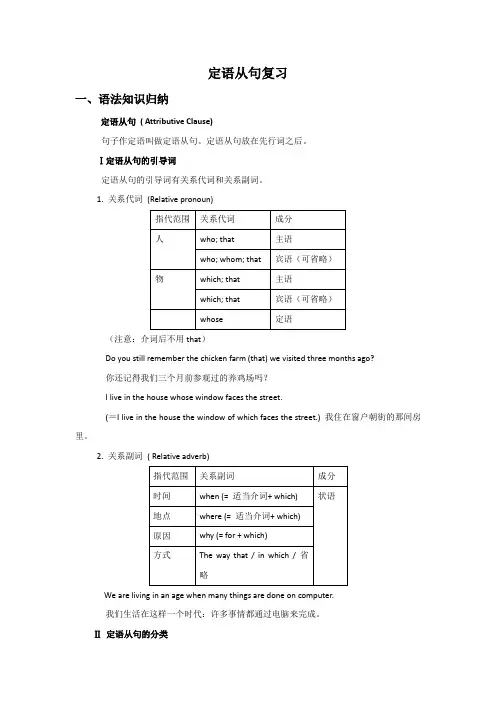
定语从句复习一、语法知识归纳定语从句( Attributive Clause)句子作定语叫做定语从句。
定语从句放在先行词之后。
Ⅰ定语从句的引导词定语从句的引导词有关系代词和关系副词。
1. 关系代词(Relative pronoun)(注意:介词后不用that)Do you still remember the chicken farm (that) we visited three months ago?你还记得我们三个月前参观过的养鸡场吗?I live in the house whose window faces the street.(=I live in the house the window of which faces the street.) 我住在窗户朝街的那间房里。
2. 关系副词( Relative adverb)We are living in an age when many things are done on computer.我们生活在这样一个时代:许多事情都通过电脑来完成。
Ⅱ定语从句的分类定语从句分为限制性定语从句和非限制性定语从句。
限制性定语从句(一)限制性定语从句的基本特征限制性定语从句对被修饰的先行词有限定制约作用,使该词的含义更具体,更明确。
限制性定语从句不能被省略,否则句意就不完整。
从句与先行词之间没有逗号。
He has two sons who work in the same company. (Perhaps he has more than two sons.) 他有两个在同一家公司工作的儿子。
(二)限制性定语从句中关系代词的用法1. that, which当先行词指物,并且关系代词在定语从句中充当主语或宾语时,用which/that 引导定语从句。
在限制性定语从句中有些情况下只能用关系代词that,不用which。
(1) 当先行词是不定代词all, much, little, something, everything, anything, nothing, none, the one时。
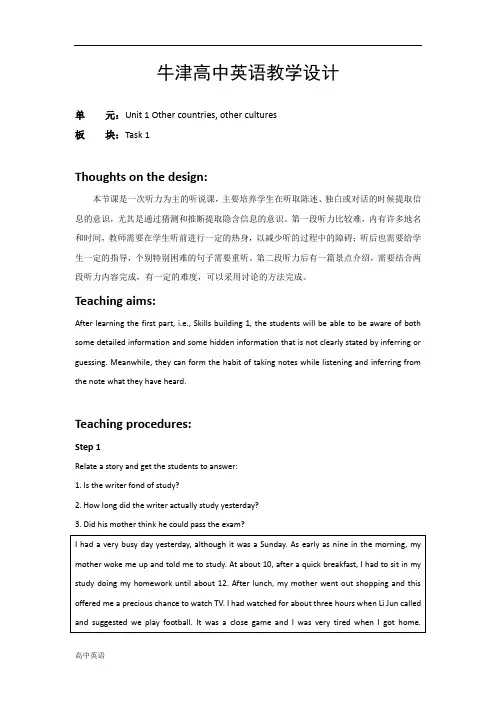
牛津高中英语教学设计单元:Unit 1 Other countries, other cultures板块:Task 1Thoughts on the design:本节课是一次听力为主的听说课,主要培养学生在听取陈述、独白或对话的时候提取信息的意识,尤其是通过猜测和推断提取隐含信息的意识。
第一段听力比较难,内有许多地名和时间,教师需要在学生听前进行一定的热身,以减少听的过程中的障碍;听后也需要给学生一定的指导,个别特别困难的句子需要重听。
第二段听力后有一篇景点介绍,需要结合两段听力内容完成,有一定的难度,可以采用讨论的方法完成。
Teaching aims:After learning the first part, i.e., Skills building 1, the students will be able to be aware of both some detailed information and some hidden information that is not clearly stated by inferring or guessing. Meanwhile, they can form the habit of taking notes while listening and inferring from the note what they have heard.Teaching procedures:Step 1Relate a story and get the students to answer:1. Is the writer fond of study?2. How long did the writer actually study yesterday?3. Did his mother think he could pass the exam?Answers:1. No, he isn’t.2. For only two hours.3. No, she didn’t.Ask the students: How do you know?1. The writer isn’t fond of study?2. He studied for only two hours?3. The writer’s mother didn’t think he could pass the exam?Answer:From the story, we know that the writer hates to get up early to study. He only studied between about 10 and 12, which is approximately two hours. Besides this, he did nothing but watch TV or play football. The mother’s way of speaking when she says, “Oh, really? I wish you could.”with a cold smile suggests that she didn’t think he could pass the exam.Summary:When you are listening to a speech or a conversation, sometimes you have to infer or guess some of the information that is not clearly stated; or sometimes you have to pay special attention to the detailed information though it’s mentioned directly. In this case, you have to take notes and see what you can learn from the speech or conversation.[Explanation]这一部分作为热身,主要是让学生知道:不管是文章、独白还是对话,都有可能存在着一些隐含信息,而获取隐含信息的主要途径是推断或猜测。
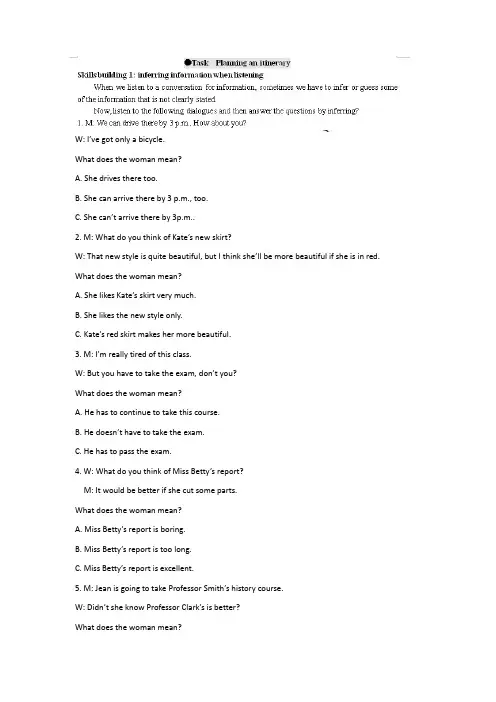
W: I’ve got only a bicycle.What does the woman mean?A. She drives there too.B. She can arrive there by 3 p.m., too.C. She can’t arrive there by 3p.m..2. M: What do you think of Kate’s new skirt?W: That new style is quite beautiful, but I think she’ll be more beautiful if she is in red. What does the woman mean?A. She likes Kate’s skirt very much.B. She likes the new style only.C. Kate’s red skirt makes her more beautiful.3. M: I’m really tired of this class.W: But you have to take the exam, don’t you?What does the woman mean?A. He has to continue to take this course.B. He doesn’t have to take the exam.C. He has to pass the exam.4. W: What do you think of Miss Betty’s report?M: It would be better if she cut some parts.What does the woman mean?A. Miss Betty’s report is boring.B. Miss Betty’s report is too long.C. Miss Betty’s report is excellent.5. M: Jean is going to take Professor Smith’s history course.W: Didn’t she know Professor Clark’s is better?What does the woman mean?A. Jean should take Professor Clark’s history course.B. Jean should take Professor Smith’s history course.C. Jean should take another better course.Step 1: listening to a conversation for details:1. Now, let’s listen to a phone call about the arrangement of a cultural exchange tour and fill in a table with details you hear of infer from the conversation.2. Now, please go over the instructions in Part B and go on to complete the note sheet. Please check the answers.3. Read the travel book listing a number of famous places on New York in Part C4. Pair work: Discuss in groups of four and decide which places are suitable to visit based on PartsA and B. After that, state your reasons for your choices.Skills building 2: asking for repetition of information1. when a speaker speaks very fast, and you need to make sure that you have got the correct details, what would you do?Sometimes, it is important for us to ask for repetition or repeat the information yourselves whenever necessary.2. Now, please present as many ways of asking got a repetition as possible. Remember that you should e polite when asking for repetition.3. Practice: practice asking repetition in groups and make sure that you can use the language items learnt in this part.Step 2: asking a travel agent for more informationNow, let’s use the skills we just learned to have a telephone conversation with a travel agent.1. Work in groups of four. Study the form carefully.2. Work in pairs. One acts as the student and the other as the travel agent.Skills building 3: writing an itinerary1. Discussion:What should be listed in an itinerary?Times and dates for different stages of the journey.Details about the places to visit, as well as contact details.2. Read the guidelines in this part as well as the five points on page 13.Step 3: writing an itinerary for a trip to New York. Now, let’s try to draw up an itinerary for the orchestra’s trip to New York using the information gathered in Steps 1 and 2.。
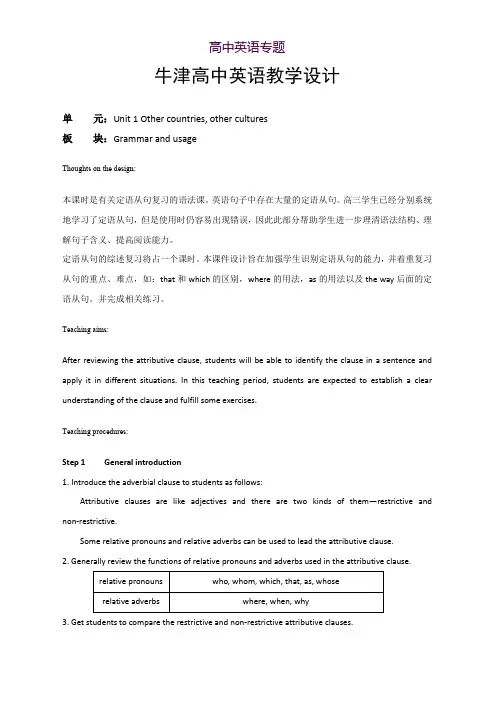
牛津高中英语教学设计单元:Unit 1 Other countries, other cultures板块:Grammar and usageThoughts on the design:本课时是有关定语从句复习的语法课。
英语句子中存在大量的定语从句。
高三学生已经分别系统地学习了定语从句,但是使用时仍容易出现错误,因此此部分帮助学生进一步理清语法结构、理解句子含义、提高阅读能力。
定语从句的综述复习将占一个课时。
本课件设计旨在加强学生识别定语从句的能力,并着重复习从句的重点、难点,如:that和which的区别,where的用法,as的用法以及the way后面的定语从句。
并完成相关练习。
Teaching aims:After reviewing the attributive clause, students will be able to identify the clause in a sentence and apply it in different situations. In this teaching period, students are expected to establish a clear understanding of the clause and fulfill some exercises.Teaching procedures:Step 1 General introduction1. Introduce the adverbial clause to students as follows:Attributive clauses are like adjectives and there are two kinds of them—restrictive and non-restrictive.Some relative pronouns and relative adverbs can be used to lead the attributive clause.2. Generally review the functions of relative pronouns and adverbs used in the attributive clause.3. Get students to compare the restrictive and non-restrictive attributive clauses.Step 2 Review of the attributive clause1. Help students compare THAT and WHICH used in attributive clauses by completing the following sentences.1) Do you have anything __________ you don’t understand?2) The only thing __________ we can do is to give you some advice.3) Who is the man __________ is standing there?4) Her bag, in __________ she put all her money, has been stolen.5) She heard a terrible noise, __________ brought her heart into her mouth.2. Ask students to deal with the attributive clauses beginning with “prep. + which / whom”.1) Do you know the boy ____________ your mother is talking?2) He gave me some novels ____________ I am not very familiar.3) I still remember the day ____________ I first got to Paris.4) Do you like the book ____________ she paid $10?5) He built a telescope ____________ he could study the skies.3. Ask students to learn the usage of WHERE in attributive clauses. “Where” can be used to no t onlyrefer to a place, but also to represent a situation. Therefore, “where” can be used after such words as point, situation, part, case and condition.Can you tell me the office where he works?I’ve come to the point where I can’t stand him.The country is in the situation where a war will break out at any time.4. Ask students to learn the usage of AS in attributive clauses.(1) Compare the following sentences:It is known to all that having a good knowledge of vocabulary is basic to language learning.→As is known to all, having a good knowledge of vocabulary is basic to language learning.(2) Point out that “as” can be used at the beginning of a sentence to refer to the main clause.There are some set phrases with “as”: as anybody can seeas we had expectedas often happensas is mentioned above ...(3) “As” can be used in restrictive attributive clauses in the form of “such…as, so…as, thesame…as”. Compare the following sentences.It is such a big stone that nobody can lift it. (an adverbial clause)It is such a big stone as nobody can lift. (an attributive clause)5. Ask students to review the structure of “the way + attributive clause”. Understand the differencebetween the following sentences.The way that/ in which/不填he explained the sentence to us was not difficult to understand.The way that/ which/不填he explained to us was quite simple.Step 3 Practice1. He was educated at the local high school, ______ he went on to BeijingUniversity.A. after whichB. after thatC. in whichD. in that2. The Science Museum, ______ we visited during a recent trip to Britain, is one of London’s touristattractions.A. whichB. whatC. thatD. where3. The growing speed of a plant is influenced by a number of factors, _____ are beyond our control.A. most of themB. most of whichC. most of whatD. most of that4. For many cities in the world, there is no room to spread out further, ______New York is anexample.A. for whichB. in whichC. of whichD. from which5. We went through a period ______ communications were very difficult in the rural areas.A. whichB. whoseC. in whichD. with which6. The road conditions there turned out to be very good, ______ was more than we could expect.A. itB. whatC. whichD. that7.The man pulled out a gold watch, ______ were made of small diamonds.A. the hands of whomB. whom the hands ofC. which the hands ofD. the hands of which8. I’ll give you your friend’s home address, ______ I can be reached most evenings.A. whichB. whenC. whomD. whereStep 4 ConsolidationAsk students to deal with some multiple choices about the three types of clauses.1. Occasions are quite rare _____ I have the time to spend a day with my kids.A. whoB. whichC. whyD. when2. I used to love that film _____ I was a child, but I don’t feel it that way any more.A. onceB. whenC. sinceD. although3. I’m sorry you’ve been waiting so long, but it’ll still be some time _____ Brian get back.A. beforeB. sinceC. tillD. after4. Yesterday she sold her car, _____ she bought a month ago.A. whomB. whereC. thatD. which5. We’ll have a picnic in the park this Sunday _____ it rains or it’s very cold.A. sinceB. ifC. unlessD. until6. The companies are working together to create _____ they hope will be the best means oftransport in the 21st century.A. whichB. thatC. whatD. who7. They will fly to Washington, _____ they plan to stay for two or three days.A. whereB. thereC. whichD. when8.—Did you return Fred’s call?—I didn’t need to ____ I’ll see him tomorrow.A. thoughB. unlessC. whenD. because9. When asked _____ they needed most, the kids said they wanted to feel important and loved.A. whatB. whyC. whomD. which10. Later in this chapter cases will be introduced to readers ______ consumer complaints haveresulted in changes in the law.A. whereB. whenC. whoD. whichStep 5 HomeworkTranslate the following sentences.1. 我们在做出任何决定之前,应该听一听其他人的意见。
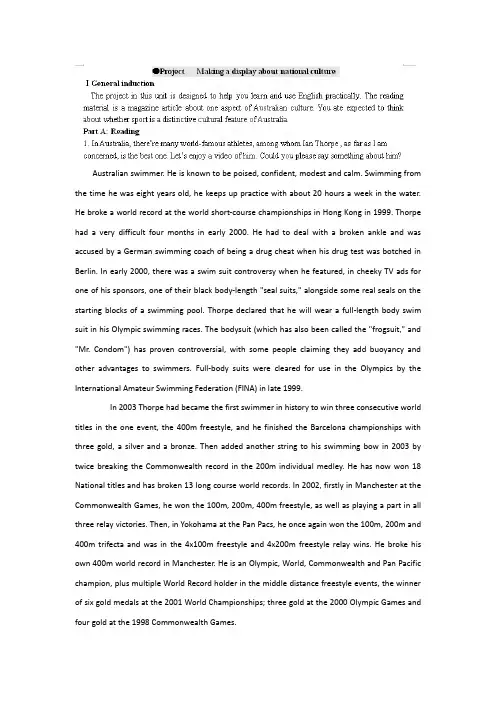
Australian swimmer. He is known to be poised, confident, modest and calm. Swimming from the time he was eight years old, he keeps up practice with about 20 hours a week in the water. He broke a world record at the world short-course championships in Hong Kong in 1999. Thorpe had a very difficult four months in early 2000. He had to deal with a broken ankle and was accused by a German swimming coach of being a drug cheat when his drug test was botched in Berlin. In early 2000, there was a swim suit controversy when he featured, in cheeky TV ads for one of his sponsors, one of their black body-length "seal suits," alongside some real seals on the starting blocks of a swimming pool. Thorpe declared that he will wear a full-length body swim suit in his Olympic swimming races. The bodysuit (which has also been called the "frogsuit," and "Mr. Condom") has proven controversial, with some people claiming they add buoyancy and other advantages to swimmers. Full-body suits were cleared for use in the Olympics by the International Amateur Swimming Federation (FINA) in late 1999.In 2003 Thorpe had became the first swimmer in history to win three consecutive world titles in the one event, the 400m freestyle, and he finished the Barcelona championships with three gold, a silver and a bronze. Then added another string to his swimming bow in 2003 by twice breaking the Commonwealth record in the 200m individual medley. He has now won 18 National titles and has broken 13 long course world records. In 2002, firstly in Manchester at the Commonwealth Games, he won the 100m, 200m, 400m freestyle, as well as playing a part in all three relay victories. Then, in Yokohama at the Pan Pacs, he once again won the 100m, 200m and 400m trifecta and was in the 4x100m freestyle and 4x200m freestyle relay wins. He broke his own 400m world record in Manchester. He is an Olympic, World, Commonwealth and Pan Pacific champion, plus multiple World Record holder in the middle distance freestyle events, the winner of six gold medals at the 2001 World Championships; three gold at the 2000 Olympic Games and four gold at the 1998 Commonwealth Games.Personal Best Times :100m freestyle: 48.71 - 2nd fastest Australian all-time200m freestyle: 1:44.06 - World Record400m freestyle: 3:40.08 - World Record800m freestyle: 7:39.16 - World Record100m backstroke: 55.38 -3rd fastest Australian all-time2. Read the article and find out as much information as possible about Australia. Answer the following questions:When we talk about Australian people, what would you think of?What sports are popular in Australia?Why are they so popular?3. Read the article again and fill in the following chart.4.Discussion: Do you agree that Australia is a sporting nation? Why or why not?5. Finish Parts B1 and B2 on page 103.6. Let’s turn to Parts D1 and D2 on page 105 of the Workbook.Part B:1. Read the reading passage in Part A again and ask questions about the parts they you don/t understand.2. Work in pairs to discuss the questions in Part B.3. Present your project to the class.Homework:Read Part A on page 109 of the workbook.。
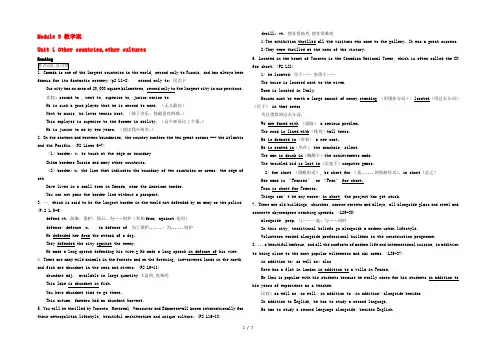
Module 9 教学案Unit 1 Other countries,other culturesReading1. Canada is one of the largest countries in the world, second only to Russia, and has always been famous for its fantastic scenery.(p2 L1-2) second only to: 仅次于Our city has an area of 20,000 square kilometres, second only to the largest city in our province. 比较: second to , next to, superior to, junior/senior to He is such a good player that he is second to none. (无人能比) Next to music, he loves tennis best. (除了音乐,他最喜欢网球。
)This employee is superior to the former in ability. (这个雇员比上个强。
) He is junior to me by two years. (他比我小两岁。
)2. On the eastern and western boundaries, the country borders the two great oceans --- the Atlantic and the Pacific. (P2 Lines 6-7)(1)border: v. to touch at the edge or boundary China borders Russia and many other countries.(2)border: n. the line that indicates the boundary of two countries or areas/ the edge of sthDave lives in a small town in Canada, near the American border. You can not pass the border line without a passport.3. …, which is said to be the longest border in the world not defended by an army or the police. (P.2 L.5-6)defend vt. 防御,保护,保卫,为……辩护(常和from, against 连用) defence/ defense n. in defence of 为了保护......;为......辩护 He defended her from the attack of a dog. They defended the city against the enemy.He made a long speech defending his view.= He made a long speech in defense of his view. 4. There are many wild animals in the forests and on the freezing, ice-covered lands in the north, and fish are abundant in the seas and rivers. (P2 L9-11)abundant adj. available in large quantity 丰富的,充裕的 This lake is abundant in fish. You have abundant time to go there.This autumn, farmers had an abundant harvest.5. You will be thrilled by Toronto, Montreal, Vancouver and Edmonton-all known internationally for their metropolitan lifestyle, beautiful architecture and unique culture. (P2 L16-18)thrill: vt. 使非常高兴,使非常激动1)The exhibition thrilled all the visitors who came to the gallery. It was a great success. 2)They were thrilled at the news of the victory.6. Located in the heart of Toronto is the Canadian National Tower, which is often called the CN for short. (P2.L21)1) be located: 位于…… 坐落于……The house is located next to the river.Rome is located in Italy. Houses must be worth a large amount of money standing (用现在分词)/ located (用过去分词)(位于) in that areas关注类似的过去分词。
牛津高中英语教学设计单元:Unit 1 Other countries, other cultures板块:Reading 1Thoughts on the design:本节课是本单元的重点,阅读部分。
这一部分主要考察的是学生的阅读能力,而且在内容上也是整个单元的中心部分。
通过对加拿大的基本情况的描述灌输给学生加拿大的文化、地域、城市、特色等方面的知识,正呼应了这一单元的主旨:Other countries, other cultures。
这节课的设计中,除了培养学生对英语的阅读能力,还在听和说两方面着手,以这篇文章内容为题材,从听、读、说和文化知识渗透4个方面培养学生多方面的能力,把学生的各个感官都调动起来,并且激发他们思考和组织语言的能力。
Teaching aims:After the reading comprehension, the students will be able to develop their reading skills;After the listening comprehension, the students will be able to develop their listening skills;After learning the information about Canada, the students will be able to know more about the culture, major cities, tourist attractions and other things in Canada, thus developing their interest in foreign cultures;After the discussion, the students will be able to develop their speaking skills, especially the ability to organize sentences.Teaching procedures:Step 1 Lead-inShow a map of Canada to the studentsWhat is this country?Can you remember the information we mentioned about Canada yesterday?Do you have something more to add?What is the capital city of Canada? —OttawaWhat is largest city of Canada? —TorontoWhat are the official languages that are used in Canada? —English and FrenchCan you name some famous people from Canada? —Shania Twain (a famous singer); Sir John A Macdonald…[Explanation]这一步骤是为了活跃课堂气氛,激发学生的兴趣。
牛津高中英语教学设计单元:Unit 1 Other countries, other cultures板块:Welcome to the unitThoughts on the design:本节课是以说为主的单元引入课。
目的是为接下去要学习的新的单元做知识的导入和激发学生对单元其他部分的兴趣。
这一单元主要是对各个国家的不同文化的介绍,对各国的文化学生应该都有些认识和了解,但是不一定会了解得比较具体、深入,用英语表达出来也不是那么容易。
所以在这单元的第一节课中,主要还是通过让学生开动脑筋思考和回答问题及对一些不同国家不同文化的介绍来加深学生对文化的认识和不同地方文化之间的比较。
通过积极参与和团体合作让学生和课堂融为一体,把课堂活动和知识渗透交织在一起,真正地把课堂气氛激活起来,并为本单元下面内容的学习打好基础。
Teaching aims:After answering the questions, the students will be able to develop their speaking skills;After working with their partners, the students will be able to realize the importance of co-operation;After learning some different cultures in different countries, the students will be able to know more about the countries and cultures and can have a clear idea of the differences between cultures.Teaching procedures:Step 1 BrainstormingDifferent countries have different cultures. Learning about other countries and their cultures is a particularly enriching experience.From which aspect can a country’s culture be reflected?Can you find out which country does the following symbol represent? (Use the PPT to show the students the pictures one by one and ask them to answer the questions)[Explanation]这一步骤是为了活跃课堂气氛,激发学生的兴趣。
牛津高中英语教学设计单元:Unit 1 Other countries, other cultures板块:ProjectThoughts on the design:本课旨在帮助学生通过一篇“澳大利亚是否是一个热爱运动的国度”的文章的阅读,模仿写一篇关于中国文化特征的议论文。
仔细研读,我发现这篇文章论点鲜明、论据确凿、用词精当、感情色彩浓厚,文章的间架结构组织得非常严密。
因此,我认为本节课的重点应该放在处理阅读上,在认真学习了文章的写作技巧的基础上引导学生模仿叙述方能水到渠成。
本课原来要求制作一个活动挂图,由于时间、资源等方面的限制,难度较大。
教师可以在课堂上要求学生提出设计思路,课后安排一定的时间给学生通过小组合作完成和展示。
Teaching aims:After reading Is Australia really a sporting nation? the students will not only be able to list the reasons why the writer says Australia is a sporting nation, know how this article is organized, but also realize how to make your article more persuasive;After learning, the students will be able to display one distinctive aspect of the Chinese culture, organize their projects and present their projects to the class.By working together, the students will learn how to cooperate in groups when trying to complete a project.Teaching procedures:Step 1Have a free talk with the students about countries with some famous aspects of its culture. Ask: What do you suppose people think about when France, Britain, India or Australia is mentioned? France—wines, diets, romanceBritain—the British reserveIndia—dance, filmsAustralia—rare animals, beautiful scenery, the 2000 Sydney Olympics, people who love outdoor sports …Investigate: Do you think sport is an important cultural aspect of Australia? Write the number of those who agree and the number of those who disagree on the blackboard.[Explanation]这一部分作为热身,既顺利过渡到文章的阅读,又能通过交流拓宽学生的视野,丰富其文化内涵。
牛津高中英语教学设计单元:Unit 1 Other countries, other cultures板块:Task 2Thoughts on the design:这节课后面的内容说多不多,说少不少,其中Skills building 2部分是口语练习,主要学习如何请人重复所说的话。
这一部分可以结合语法中的间接引语的复习,帮助学生学习“请求重复信息”的一些日常用语以及重复所讲内容时可能需要注意的时态一致的问题,并结合上一节课的听力内容进行操练。
此后,根据写作要求指导学生完成行程安排表。
当然,把安排表转化成一篇通顺、连贯的文章也是高考对学生写作能力的要求之一。
所以在本课最后,将结合高考的要求让学生在自拟一则安排表的基础上写一篇口头通知。
Teaching aims:After learning Skills building 2, the students will be able to use different expressions to ask for repetition of information, especially of important information. At the same time, they are supposed to practise repeating a sentence, using correct indirect speech.After learning Skills building 3, the students will be able to have a clearer understanding of what should be paid attention to when writing a travel plan. Then, with the information from Step 1 and Step 2, they should draw up a travel plan for the orchestra’s trip to New York. However, they should also learn to turn a travel plan into a complete speech.As well as language knowledge and skills in oral repetition and written work in a travel plan, the students should also realize the importance of good manners, especially in asking for repetition.Teaching procedures:Step 1Tell the students something about yourself. Then suddenly stop and ask: Sorry, what did I say just now? Get the students to retell your words, using indirect speech.Read the sentences on the screen and have the students to turn them into indirect speech.1. “You should be more careful next time,” his father said to him.2. Mr. Wang sa id: “I will leave for Shanghai on business next month, children.”3. “I haven’t heard from my parents these days,” said Mary.4. The geography teacher said to us, “The moon moves around the earth and the earth goes round the sun.”5. She said to him, “It’s time that you left here.”Answers:1. His father told him to be more careful next time.2. Mr. Wang told the children that he would leave for Shanghai on business the next month.3. Mary said she hadn’t heard from her parents those days.4. The geography teacher told us the moon moves around the earth and the earth goes round the sun.5. She told him to leave there.[Explanation]直接引语和间接引语的转换,不仅是中学阶段语法学习的一个重点和难点,也是日常英语会话经常见到的一种语法现象。
牛津高中英语教学设计单元:Unit 1 Other countries, other cultures板块:Word powerThoughts on the design:本节课是词汇教学课。
词汇教学在高中英语教学中占据重要位置,正如著名语言学家威尔金斯(D.A.Wilkins)曾经说过“Without grammar, very little can be conveyed; without vocabulary, nothing can be conveyed.” 这句话的中文意思是“没有语法,难以表达;没有词汇,寸步难行。
”词汇教学有效的方法之一就是按主题将相关词汇分类组块学习,这有助于学生的长期记忆和灵活运用。
本节课词汇学习的焦点是关于描述国家的单词,即从哪些方面介绍一个国家。
Teaching aims:After learning the section, the students will be able to know what words can be used to describe a country. They are expected to use the words learnt in class to complete the relevant exercises. Meanwhile, the students will gain some knowledge of the United Kingdom, which helps them to promote their cross-cultural awareness.Teaching procedures:Step 1 Brainstorming1. Begin the lesson by reviewing the reading passage ‘Canada—land of the maple tree’. Ask students to answer the following question:What subjects are covered in the passage of Canada—land of the maple tree?2. Show the pictures of Big Ben and TowerBridge to students, and ask them the questions:(1) Do you know the buildings in the pictures?(2) In which country do they lie? (In the United Kingdom.)3. Ask students to think about the following question:If we were to write a book about the United Kingdom, what subjects should be covered in the book?[Explanation]鼓励学生尽可能多地说出相关词汇。
牛津高中英语教学设计单元:Unit 1 Other countries, other cultures板块:Reading 2Thoughts on the design:本节课Reading的第二个课时,主要是针对课文中出现的一些较难的单词、词组的用法和较复杂的句子结构进行详细地讲解。
通过对语言点的讲解,使学生能够掌握在高中期间所要学习的语言点,能够灵活地去加以使用。
考虑到语言教学的多样性和学生注意力的易分散性,本课在进行语言点的讲解时运用了多种讲解方法:有直接进行知识灌输的,有通过翻译让学生加深了解的,有给出多个句子让学生比较的,有让学生翻译的,充分地调动出学生的积极性。
Teaching aims:After the introduction to the usage of the important words or phrases, the students will be able to know the usage of the words;After analyzing the complex sentences, the students will be able to develop their ability to analyze long sentences;After various kinds of exercises, the students will be able to consolidate what they have learnt and master the usage of the language points.Teaching procedures:Step 1 Language Points1. Canada is one of the largest countries in the world, second only to Russia, and has always been famous for its fantastic natural scenery. (L1)second to 次于second only to 仅次于second to none 最佳的,不亚于任何人的2. Canada has vast areas of wilderness, from the Arctic north, where average winter temperatures are usually minus 20 degrees centigrade, to the 8,892-kilometre-long border with the USA in the south, which is the longest border in the world not defended by an army or the police. (L2)Ask the students to find out the 2 attributive clauses in this sentence, and analyze the two clauses.Ask the students to translate the sentence.加拿大有辽阔的荒原,北起北极——那里的冬季平均气温通常是零下20摄氏度,南与美国比邻——边境线长达8,892千米,是世界上最长的没有军队或警察设防的边境线。
U1 重点词汇讲解(一)重点动词讲解1. rankvi. & vt. 属于某等级,将……归为某等级He ranks among the best pupils of his grade.他是他们年级最好的学生之一。
n. (尤指较高的)等级,级别He is a physicist of the first rank.他是一流的物理学家。
2. associatevt. 联想,联系Many people associate dark clouds with depression.许多人把乌云与沮丧联系起来。
【拓展】association n. 联合, 结合;协会, 社团Our long association with your company has brought great benefits.我方和贵公司的长期合作带来了巨大的利益。
The association is/are having its/their annual conference next week.该协会在下个星期举行年度会议。
3. owev. 欠,应向……付出;得感谢,应归功于I will owe nearly a hundred pounds on that car.我为买车还将欠将近100英镑。
We owe everything to you, doctor.多亏了您,医生。
【拓展】owing to由于,因为Now his crops completely failed, owing to a disease that had broken out last month.由于上周爆发的病害,他的庄稼全部欠收。
表示“因为、由于”的类似短语还有due to/thanks to/as a result of等4. equipv. 配备,装备equip sb./sth. with sth.be equipped with sth. 装备有……The soldiers were well equipped with the latest weapons.士兵们配备好了最新式的武器。
【拓展】equipment[U] n. 设备,装备There is a lot of modern equipment in our school.我们学校有许多现代化的装备。
(二)重点名词讲解1. sheetn. 薄片,被单,纸张Mother is putting a clean sheet on the bed.妈妈正在铺干净的床单。
a sheet of paper 一张纸The book is in sheets.这本书尚未装订。
2. settlementn. 解决,处理The strikers have reached a settlement with the employers.罢工的人已和雇主达成协议。
【拓展】settlevt. & vi. 定居;停留;解决,处理After years of travel, we decided to settle here.我们旅行多年后,决定在此定居。
It’s time you settled your dispute with him.是时候你和他把争端解决了。
settle down安定/安顿下来It’s terrible. I can’t settle down to anything today.真糟糕,我今天无法安下心来做任何事。
3. immigration n. 移民an immigration office 移民局【拓展】immigrate v. 移入(外国定居)His grandfather immigrated from Italy to America in the 1930s.他的祖父在20世纪30年代从意大利移民到美国的。
immigrant n. 移民者Early immigrants from Europe lived a hard life in America at that time.那时早期的欧洲移民在美国过着艰苦的生活。
(三)重点形容词,介词讲解1. content adj. 满足的be content with sth.to do 满足于……He is content with the present life. 他安于现状。
The old man is well content to live alone in his small house.那位老人很满足于独自一人生活在他那间小屋里。
【拓展】vt. content oneself with 满足于……,对……感到满足He contents himself with the present life.他安于现状。
As there is no sugar, we have to content ourselves with black coffee.既然没有糖,我们只好喝清咖啡。
n. 里面的东西,内容;目录Please show me the contents of your suitcase.请把你箱子里的东西拿给我看看。
2. unfit adj.不合适的fit adj. 合适的be fit for sth./ sb.to do sth.The food was unfit for the Chinese.这食物不适合中国人吃。
(四)重点词组讲解1. be home to是……的家园,是……的所在地China is home to giant pandas. 中国是熊猫的家园。
2. seek one’s fortune外出寻找发财机会,外出闯荡Joanna asked her father if she might go out into the world and seek her fortune.安娜问父亲她是否可以到世界上去另寻出路。
3. little more than 只是……而已;只有,仅仅Aid to the Third World is at present little more than a drop in the ocean.目前对第三世界的援助不过是杯水车薪。
【拓展】more than超过, 多于;不仅仅This city has a population of more than 1,000,000.这个城市人口超过一百万。
She wishes to be treated as nothing more than a common girl.她希望被对待得只不过像一般的女孩子。
三、词汇拓展训练(一)单项填空1. China is a wonderful land ______ minerals.A. is abundant inB. abundant inC. in abundantD. is in abundant2. Zhongguancun is ______ the Chinese Academy of Sciences and more than ten famous universities.A. the home toB. home ofC. home toD. a home to3. We often associate the name of Li Ning ______ gymnastics.A. withB. byC. toD. in4. Across the Yangtze River ______ more than one bridge, the Nanjing Changjiang Bridge being the first one.A. layB. lieC. liesD. laid5. —Do you let your kids travel alone at night?—______.A. AbsolutelyB. Absolutely notC. It’s up to youD. Every day counts6. —What ______ weather!—Yes, it must be the wind that makes it so cold and many roads are ______ hard.A. freezing; freezingB. frozen; frozenC. frozen; freezingD. freezing; frozen7. Lizzie was ______ to see her friend off at the airport.A. a little more than sadB. more than a little sadC. sad more than a littleD. a little more than sad8. They said they liked the ______ of your article, but the style wasn’t quite right for the magazine.A. wordsB. meaningC. contentD. lines9. —What can I do for you?—I’d like to buy a tie ______ this brown shir t.A. to match withB. to fitC. to go withD. to suit10. Try some of this salad. You will say it’s ______.A. second to noneB. the second to noneC. best of noneD. the best of none(二)单词拼写(每空一词)1. It is amazing to see so many wild plants and animals in African ____________ (丛林).2. People have lost ____________ (耐心) with the slow pace of reform.3. We are so disappointed that he gave us an ____________ (模棱两可的) answer.4. Is English a ____________ (必修) subject in your school?5. What ____________ (百分比) of his income is paid in income tax?6. Everyone has his own ____________ (弱点).7. Sport and ____________ (娱乐) have always been part of university life.8. Young people are not ____________(满足) to stand and look at works of art; they want art they can participate in.9. He has some ____________ (意料之外的) guests before he left his home, so he had to change his plan.10. After such a long thirsty journey, the ____________ (旅行者) drank the fresh spring water. (三)词组填空(选出合适的单词并用正确的形式填空)1. Every classroom in the modern school _______________ a new TV set.2. Please _______________ the application form carefully so that I can make it out.3. Though she lives in a small flat, she _______________ her present life.4. Attracted by the idea of working abroad, a considerable amount of talent _______________ this country each year.5. The boy left school and went to the big city to _______________.(四)综合填空(每空一词)1. —Jim is scolded by his father.—It serves him right. He ____________ a large sum of money in playing computer games. 2. —Are you satisfied with the ____________ in London?—Not really. It is rainy there.3. —We all like Miss Green very much.—She is a teacher famous for her ____________ to her students.4. —The 2008 Olympic Games is a great one.—I agree with you. Every athlete tried his best to win his ____________.5. —____________ is falling now. I must go home.—Nice having you here.6. —Michelle and Mary are arguing about who is better in performance.—They should find a ____________ of dispute.(五)短文填空(每空一词)Canada, the second 1 country as well as the best country for living in the world, 2 the two great oceans—the Atlantic and the Pacific. Famous for its natural scenery, it is a huge country with vast mountain ranges, enormous open plains, countless rivers and seemingly endless forests. It is a paradise for those who love outdoor 3 . One is 4 to hike, sail, cross-country ski or travel by snowmobile for days without meeting another person.Toronto, which is said to be the most multicultural city in the world, has 5 from Ireland, Portugal, China, Lebanon, Italy and Vietnam. Montreal, the second largest city in Canada, 6 Old World and New World architecture and culture. Vancouver is not 7 in size, but it has superb scenery, a beautiful harbour and all the comforts of modern life and international cuisine. Edmonton, home to the West Edmonton Mall, also 8 lots of visitors every year.Another famous 9 in Canada is Niagara Falls, which is shaped like a semicircle. The Falls fall 56 metres in an awesome white sheet of water. Finally, when visiting Canada during the autumn, it is 10 for one to see Canada’s national symbol—the maple leaf.1. 2. 3. 4. 5.6. 7. 8. 9. 10.参考答案(一)单项填空1 – 5 BCACB 6 – 10 DBCCA(二)单词拼写1. jungles2. patience3. ambiguous4. compulsory5. percentage6. weakness(es)7. recreation8. content9. unexpected 10. traveller(三)词组填空1. is equipped with2. fill out3. is content with4. is lost to5. seek his fortune(四)综合填空1. wasted2. climate3. devotion4. competitors5. Dusk6. settlement(五)短文填空1. largest2. borders3. activities4. likely5. residents / immigrants6. mixes7. small8. attracts9. resort 10. fortunate。